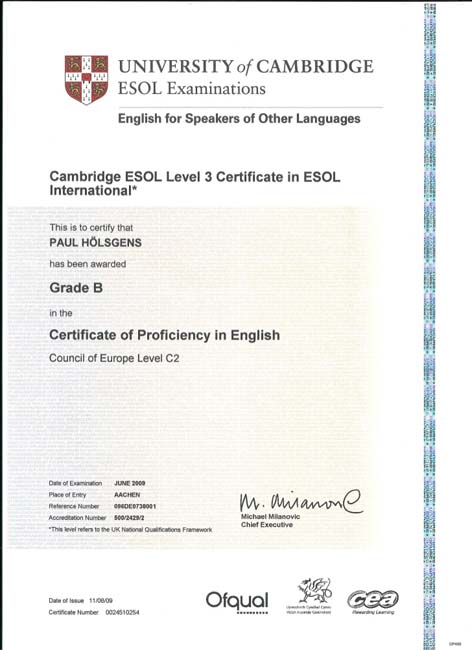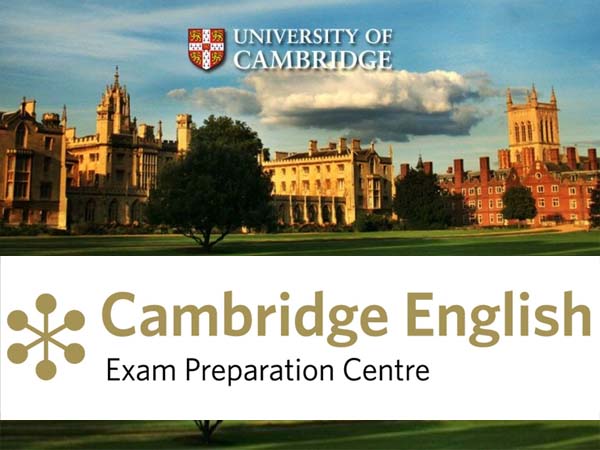Cambridge Certificate of Proficiency in English (CPE) and other tests.
What is the English language proficiency test of Cambridge?
At the English Academy, we have helped numerous people successfully pass the Cambridge English proficiency exam over the last 25 years. Here, we will clearly explain what it is and how the exam is structured.
The C2 proficiency is one of the official certificates of English as a foreign language, or ESOL examinations, that are offered by The University of Cambridge. The name also refers to the test you must pass in order to get the certificate. (IELTS is not an ESOL exam and will not be discussed here.)
Since the language level of learners of English varies a lot, exams of different degrees of difficulty have been created.

Five ESOL exams – one per level
It is a bit confusing that Cambridge English introduced new names, where most people are still familiar with the old names. That is why we will give both.
The new names start with the corresponding level on the CEFR (Common European Framework of Reference for Languages), which is the European standard for language levels.
C2 Proficiency, still better known under its old name, Certificate of Proficiency in English (CPE)
This is the most advanced diploma of English as a foreign language you can pass, since it requires a level that nears the level of a native English speaker.
C1 Advanced, formerly known as Cambridge English: Certificate of Advanced English (CAE).
This diploma proves that you have an advanced level of English. It is a very popular level and is often required by English speaking universities for non-English speakers wishing to attend.
B2 First, formerly known as Cambridge English: First Certificate of English (FCE).
This can be called an upper intermediate level. It shows that you can get by in English.
B1 Preliminary, formerly known as Cambridge English: Preliminary English Test (PET)
This is an intermediate level exam.
A2 Key, formerly known as Cambridge English: Key English Test (KET).
This certificate shows that you know basic English.
Why pass an English language test?
1. Worldwide recognition of your English level.
If you pass the C2 Proficiency test, you have official proof that you have mastered English to an exceptional level, allowing to communicate with nearly the same degree of accuracy and fluency as a native English speaker.
Since the University of Cambridge certifies your level, these exams are recognised all over the world; not only in Europe, but also in Asia, America and Africa.
2. Requirement for studies in English.
If you want to study in an English-speaking University, one of the ESOL exams is often required.
We recommend you contact the university of your choice and ask them which certificate is required. They will inform you so that you can prepare for the right test.
3. Requirement for work.
Application for certain jobs may require official proof of English language skills. A work permit in certain English-speaking countries like Canada or Australia might depend on it. Even work in one of the European organisations in Belgium or elsewhere might require a diploma.
4. Great for your career.
Even if it is not a formal requirement for a new job or a promotion, a C2 English Proficiency certificate looks damn good on your CV. Certainly in this day and age where an advanced level of English is indispensable for almost any career at a management level.
5. Challenge to become bilingual.
We often get students who have an advanced level of English but who want to get rid of the remaining flaws and hesitations. And for some of our students, it is simply a tempting challenge to realise a remarkable didactical achievement.
The goal of passing a detailed English test at the end of the school year motivates them to do more.
There is a reason why over 45 000 people from all over the world take the CPE every year.

What does the English proficiency exam look like?
There are four papers to test the different skills: reading, writing, listening and speaking.
You will receive a separate score for each skill and for Use of English. These five scores are added up to get an overall result for the exam.
Let us look at each paper separately.
A. Reading and use of English.
This part takes 1.5 hours and tests how well you understand and deal with texts of different kinds, fiction (like novels) as well as non-fiction (like newspapers, magazines or manuals). You must be able to grasp written English from different angles: the understanding of textual content, structure and organisation, and the development of opinions and ideas.
There is a total of 53 questions, divided into 7 different parts.
In the Use of English paper, you need to demonstrate your knowledge of the language system by completing various tasks at sentence, word and text level, including gap-filling, comprehension questions and a summary writing task.
B. Writing.
This part also takes 1.5 hours and it verifies that you can write texts of different types, such as essays, reviews and reports. The paper also includes questions on set texts. Responses are 300-350 words in length. The writing test is composed of 2 parts
C. Listening.
This part takes 40 minutes and it checks if you can understand and follow a number of spoken lectures, interviews and speeches. There is a total of 30 questions, divided into 4 different parts.
D. Speaking.
This part takes 16 minutes per pair of candidates and it checks your capacity to interact in conversational English in a fluent and effective way.
The Speaking Test assesses your ability to interact in conversational English in a range of contexts. You are provided with pictures and written stimulus.
The paper consists of three parts: an interview section, a collaborative task and individual long turns with discussion.

The CPE is the most advanced test of English as a foreign language, certified by the University of Cambridge. It proves that you have mastered the English language as well as most native English speakers.
The exam covers all skills: reading, listening, speaking and writing. It is a long exam, testing many facets of these skills. The test is taken in two parts: writing, listening and reading papers on one day and the speaking test another day.
For the exam dates, the locations and the exam fees, you best check online. For Belgium, you can consult the website of the British Council, that organises these exams.
The English Academy is an official Cambridge Exam Preparation Centre. This means that we prepare people for the exams that the British Council organises in collaboration with Cambridge English.
